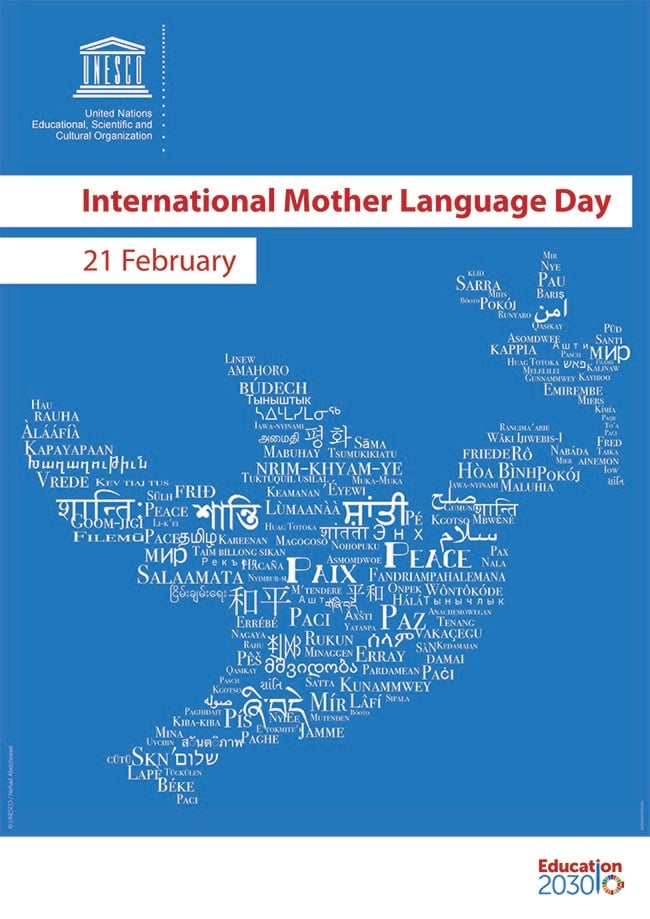
Language forms part of one’s identity and culture.
Once our indigenous language is unknown to us it becomes difficult defining who we are and where we come from.
International Mother Language Day is important because it serves as a reminder for us to go back to our roots, appreciate our indigenous language and at the same time learn other people’s languages and be aware of cultural diversity, especially in a country like South Africa.
To understand the significance of the International Mother Language Day we first have to look at its background.
The General Conference of the United Nations Educational, Scientific and Cultural Organisation established the International Mother Language Day in February 2000 to promote linguistic diversity and multilingualism.
The idea to celebrate International Mother Language Day came from Bangladesh, where on February 21 the country celebrates the anniversary when the Bangladeshis fought for the recognition of the Bangla language.
This is similar to the decision the South African government took in the 1996 Constitution where 11 official languages were recognised and nine of those languages are indigenous to South Africa and were previously not given an official status.
Even though it is highlighted in “The Use of Official Languages Act 12 of 2012” that the South African languages are given an equal status, they still lack equal usage, especially in administration.
Indigenous languages are mostly used by the society for communication purposes and are not recognised as a business language, as they are not globally known.
This has caused some of the indigenous language speakers to see their languages as less important and favour the globally spoken languages as they think that knowing a business language brings better opportunities in education and employment.
This is also seen in South Africa where indigenous language speakers would prefer to take their child to a school where they will be taught a globally recognised language rather than to go to a school where an indigenous language may be taught as a home language.
The purpose of the International Mother Language Day is also to recognise that we live in a multilingual society where all languages are treated equally and where no language is seen as more important than the other.
The other reason for celebrating International Mother Language Day is to make sure that indigenous languages are saved from extinction, as almost half of the world’s languages no longer exist.
In South Africa, we should not only focus on the preservation of the official languages but we should also remember the other 25 unofficial languages which amongst others includes Khoekhoegowab, isiPhuthi, Sepulana, and HiPai.
Should indigenous languages cease to exist, our identity and culture will be lost to the future generations and they will not know who they are. This will be a generation that expresses themselves using borrowed languages that do not relate to their identity and culture.
The University of Johannesburg, in collaboration with Indigenous Languages Initiative for Advancement (ILIFA) Lethu Institution, will be celebrating the International Mother Language Day on Friday at the University of Johannesburg’s Soweto Campus. According to ILIFA Lethu, as an organisation they “seek to provide a shield and engage in the development and preservation of indigenous languages, which are not only carriers of culture, but means of communication for the majority of South African citizens”.
The founding member of the organisation is the legendary South African actor, Mabutho “Kid” Sithole.
The highlight of the event will be a keynote address from the Chief Justice Mogoeng Mogoeng.
He will deliver a speech on the theme of indigenous languages usage: a constitutional imperative, which is also this year’s theme.
After the chief justice’s speech, there will be a question and answer session where the chief justice will be engaging with the audience.
There will also be performances by up-and-coming poets, and the People’s Poet, Mzwakhe Mbuli.
Other delegates expected in the event are Prof Brendan Barnes, acting vice-dean: Faculty of Humanities (UJ); Geoff Makhubo, executive mayor: City of Johannesburg; Prof Zilibele Mtumane, head: School of Languages - Faculty of Humanities (UJ) and Mpume Mkhize: director, Transformation Division (UJ).
• Themba Madingiza, Lecturer in the Department of African Languages, University of Johannesburg




 Publications
Publications
 Partners
Partners








